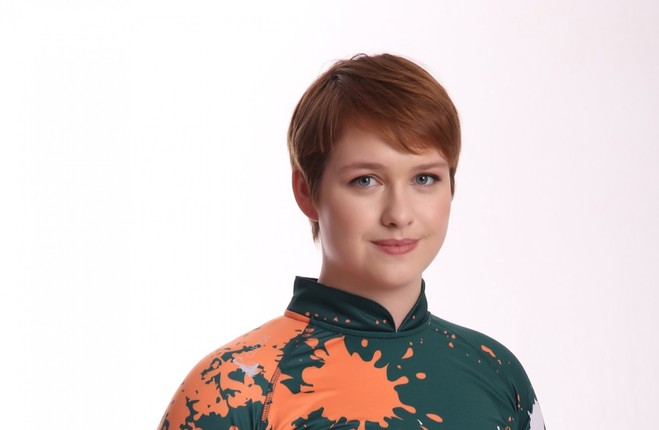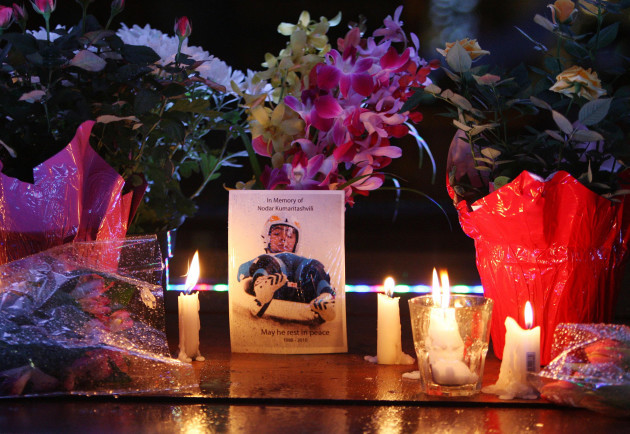ELSA DESMOND HAS always been a highly competitive person.
Born in Buckingham, England, her childhood included periods in India and Turkey, though the majority of it was spent in boarding school in Britain.
She later was part of the University of London Air Squadron and even considered enlisting in the military at one point.
While she moved around frequently as a youngster, one constant in life was sport and her passion for it.
“I’ve done almost every sport,” she tells The42. “I was a swimmer at county level, I played hockey at county level, I did hammer throw, I did gymnastics, I’ve done so many sports. And I don’t think there’s anything wrong with trying all of them.”
Now 23, not much has changed in one respect. She still loves sport and is regularly travelling to different parts of the world.
What is different, though, is that Desmond is now an international-class athlete in luge.
“It’s similar to bobsleighing,” she explains. “It’s a track, made of ice, normally between a kilometre and a mile long, between 12 and 16 corners, and we go down on a sled, feet first, lying on your back. We get speeds of up to 100-140km an hour.
“In luge, there are one or two-person sleds. I only do singles, although women’s doubles is starting to come through. And it’s the quickest time top to bottom [that's rewarded].”
Earlier this month, she became the first woman to represent Ireland in luge on the international stage, finishing 27th at the European Championships.
“The biggest achievement for me was the fact that I was there,” she says. “It’s been so difficult to get me to this point with the Irish federation and to get me over the starting line. It wasn’t a particularly good time for me. It wasn’t the best I’d done in the week. So I was a bit disappointed with my performance in the race.
“But for my first race for Ireland, I was happy to just be there and be representing [the country], and I can build on that for the future.
“I always wanted to race for Ireland. It was always in my plans. It’s quite nice, because firstly, it’s something no one can ever take away from you. Even if someone comes along that’s better than me, they can’t take ‘first’ away.
“And I hope I won’t be the last. I’m hoping to get more people in.”
27th in European champs.
— Elsa ❄️ (@elsa_desmond) January 10, 2021
BUT more significantly, 1st woman to represent Ireland Internationally in luge. beyond proud. Countless times in the last months I didnt think we would get me to the start. excited to build on this & see what this new chapter of my sports career holds! pic.twitter.com/Njgk155lKx
Desmond began her career in luge representing Great Britain, but she has family from Cavan and opted to switch to Ireland ahead of the new season.
“When I started luge, Ireland didn’t have a federation. So sliding for Ireland wasn’t an option,” she explains.
“So I started with Great Britain, but always knew at some point, I could switch if I wanted to.
“Great Britain, with the way the sport works there, you need the results to get the funding. But without the funding, it’s very difficult to get the results. I found it quite challenging that they have quite high qualifying standards, just because of other sports being so strong.
“So they don’t receive a huge amount of support and I always liked the idea of moving one day. I felt that Ireland might be a more supportive place to be and the way they looked at the Olympics was different and the way they did things was different. I always liked the idea of that, having read about it.
“I was with Team GB when I started and last winter, they had a change of coaching staff. I’m sure you know from speaking to other athletes, the relationship and the way an athlete works with a coach is hugely important, particularly in a sport as high risk as mine. The change of coaching staff just didn’t fit for me and that sometimes happens. That was when I made the decision that it was probably time to move.
“So I left GB after the first race of last season and we spent the rest of that season and the summer setting up the Irish federation.”
****
Despite the pandemic, life seems as hectic as ever for Desmond.
We arrange the interview early on a Sunday, to allow plenty of time for her to travel later in the day from her temporary base in Königssee, located in southern Germany, to Munich. Desmond must make the two-hour trip for a Covid test — she has taken two-to-three a week since the season started. The following day, she will move from Germany to Austria, where another Covid test awaits her.
While some athletes have expressed concerns about competing since the pandemic started, for Desmond, sport is “a very safe environment” by comparison to her normal day-to-day life, which entails work in a hospital.
She has just completed her final exams in a five-year medical degree at King’s College London and ultimately plans to pursue a career in emergency medicine. As you can imagine, making this commitment while also training to be an Olympic-standard athlete is not exactly straightforward.
“I’ve missed Christmas two years in a row, I’ve missed New Year’s three or four years in a row. I wish I could see my family more when I’m away for a few months, because they don’t come out here and I can’t come home.
“I’ve been very lucky in that I’ve had a lot of support from my university.
“In the early years, my lecturers filmed all the lectures, so I could watch them overseas, which was good.
“Now, when we’re on placement in hospital, I’ll go in on weekends, I’ll go in outside of the normal hours to make up for the hours that I’m missing. They’ve been really supportive in allowing me to do that, in helping me to do both. But I do spend most of the time I’m not on the ice studying.
“I’m part of a group of athletes from small nations that share a couple of coaches. So when we’re travelling, I’ll share a room with maybe the athlete from Taipei or Bulgaria. Everyone has been very supportive of the fact that I’ll always be up a bit later studying or having my lectures on in the background.”
Nonetheless, her medical commitments still sometimes limit her sporting options.
“Most people started their season end of October, beginning of November. I came out second half of December, and missed the first part of the season.
“I’ve never done a full winter season because of university.”
The pandemic, too, is partially to blame for these restrictions.
“I was meant to be moving to Norway in the summer and living there for two years. I was going to be focusing on luge, taking time out from university doing a Master’s in Sleep Medicine. I had permission from the university to get time off, I’d spoken to the Norwegian federation, this was all in place.
“And then obviously Covid happened, so I didn’t take the time off. I was meant to be doing the full season, this season and next season, but this year I’ve only done half of it, I’ve got to get my university work done.”
Desmond acknowledges she is far from the only one who has been inconvenienced of late. In fact, the entire sport has suffered. Full season plans have had to be completely altered. The World Championships, which take place later this month, is one of the many events to have been impacted — originally, it was supposed to take place in Whistler, Canada, but with racing brought to a halt in North America, it has been moved to Königssee, Germany.
Almost everything now is done in isolation. Gym work is no longer an option. It’s a small sport with a close-knit community, yet Desmond hasn’t seen many of her athlete friends at all this season.
“You go to the track and back. That’s kind of all we can do at the moment.
“We’re not at the same sessions. We’re don’t have the same race times.
“And outside of being at the track, you’re not allowed to see anyone.”
Coronavirus chaos also means it is less likely Desmond will be competing at the Beijing Winter Olympics in 2022.
“My ultimate goal is actually the Olympics in 2026. If I get to Beijing, that’ll be a bonus, but I think it might be too early in my career, though I’m still going to try for it.
“I had been intending on taking some time out from university this year and next year to allow me to focus on Beijing. But then with Covid, that didn’t happen, because they needed to get doctors through.
“So the pre-Olympic season and doing medical school finals is not an ideal situation, and so the focus has changed to 2026.”
Desmond’s performances at the five World Cup races next season will determine whether she gains enough ranking points to earn one of the 35 spots up for grabs in China.
“Normally, [qualifying] includes the pre-Olympic and the Olympic season,” she adds. “But because of Covid, this time it’s only going to be the Olympic season.”
University Exams Done! 🤞🤞🤞
— Elsa ❄️ (@elsa_desmond) January 18, 2021
And as a bonus on the side, a great week of training here in Konigssee!
Now its time to head back to the world cup circuit for the race in Innsbruck#medicine #finalexams #medicinefinals #lugelife #whateverittakes #lugelove #whateverittakes pic.twitter.com/1hHYgK8X1Y
While the ideal age to take up luge is around 11 or 12, Desmond started in her late teens and this is one of the reasons why the Irish athlete suspects she may never be at the very top level in the sport, competing for medals.
“I started too late, I don’t have the funding, a huge amount of my sport is the sleds. I don’t have a sled technician, I don’t have the money to spend on sleds. I don’t have access to the newest equipment. The Germans, Italians and Russians get a lot of funding.
“It’s like if you put Lewis Hamilton in a much slower car, he wouldn’t win. But also, I need to stop training [at times], we don’t have any stock facilities at home, so it’s a combination of everything.”
The financial limitations, perhaps, are the greatest obstacle to overcome.
“It’s not a cheap sport, there’s travel, there’s accommodation, there’s insurance. I don’t receive any funding from Sport Ireland, or I don’t have any sponsors. I nearly had one, but unfortunately, due to Covid, they had to pull out. So, I’m fully self-funded. I work as a healthcare assistant, which gets me some money. And I’ve a lot of support from my family, which I’m really lucky to have. But we have to be sensible with how we spend money. We can’t just go to every training camp and spend the whole winter in North America and do things like that, like some of the bigger nations could.
“So the biggest challenge is everything off the ice. Once you’re on the ice, it’s why you do it. If you have a sled and ice, nothing else matters.”
Another drawback of the sport is how dangerous competing can be. While athletes dying during the Olympics is extremely rare, there have been two examples of this happening in luge. In 1964, three days before Australian skier Ross Milne was killed while training for the Innsbruck Games in Austria after flying off the course and crashing into a tree, British luger Kazimierz Kay-Skrzypecki died as a result of a similar accident. In addition, at the 2010 Games in Vancouver, Georgian luger Nodar Kumaritashvili died after losing control of his sled in training and hitting a steel pole at the side of the track.
“We try not to focus on the fact that you can get injured,” says Desmond. “But mistakes happen, and then when you make mistakes, you can crash, and that’s not abnormal or a bad thing, it’s just part of the learning process. Sometimes, when you make mistakes, you can get hurt.
“I’ve been sliding for years and I’ve had a couple of injuries, but nothing major. I had a small fracture of my ankle in the World Championships a few years ago and I did still race. Then I broke a finger and had a couple of small concussions and things.
“But I’ve never had an injury so bad that it stops me from racing.”
Still though, luge is certainly not for the faint-hearted.
“Bruises are common. They’re part of the sport. Your shoulders, sometimes the backs of your thighs from your handles [hurt].
“You have to be mentally tough, because you have to be able to crash and then get back up. Particularly if you have a bad crash — not even one that hurts you, but some can be quite scary or unpleasant. Most of them are fine, most of them you just sort of roll over and then you stop. But it gets your heart going, and then you have to get back up and go again. That’s part of the sport and you do have to be quite resilient to do it. But equally, I don’t think anyone gets to this level without knowing why they’re getting back up and going again. We all love what we do and it’s worth it.”
She continues: “I think there can be a fine line in sport between the adrenaline, the excitement and getting scared. You’ve got to be on the right side of that line. I’ve always had a bit of a challenge with getting nervous, particularly on race day. But it’s about not letting yourself get scared and people do that in different ways. I don’t think it’s something people think about so much if they started very young, it comes very natural to you. It’s more of a challenge to the athletes that started when they were older. When you’re a bit older you have more of an understanding of risk and what can go wrong. Some people navigate that by not thinking about it. I think about it, knowing what could go wrong and just accept it. If that happens, it happens and we’re willing to take that risk. So it’s how you rationalise it, but you have to find a way to be okay with getting up and going again.”
You can find out more about the Irish Luge Federation here.



